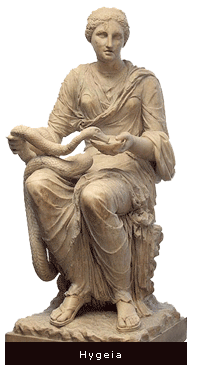GREEK MYTHOLOGY
 HYGEIA
HYGEIA
Goddess of Sanitation and Hygiene
Hygeia, the goddess of health, sanitation and hygiene, was the stepdaughter of Asclepius. She was worshipped alongside Asclepius in all his healing sanctuaries, or Asclepions.
Since ancient times, healers have noticed the close relationship between cleanliness and health. Pestilence and disease flourish where filth and impurities accumulate. Cleanse the body, both inwardly and outwardly, through diet, exercise, lifestyle and physical regimen, and most diseases are greatly ameliorated, or vanish of their own accord.
Personifying the value of diet and hygiene in health maintenance and disease prevention, Hygeia is the antithesis and complement to Asclepius. We look to Asclepius for medical miracles in times of crisis, nut first let us do all we can to maintain our health and prevent disease ourselves. The body has amazing powers of self healing if we keep it clean and live in accordance with Nature's laws.
In his book, Spontaneous Healing, Dr. Andrew Weil categorizes various approaches to the art of medicine as being either predominantly Asclepian or Hygeian. Most natural, holistic, alternative medical systems are in the Hygeian camp, whereas modern medicine is overwhelmingly Asclepian. The Hygeian approach, he maintains, is ultimately the most positive and empowering.
Hippocrates wasn't a fanatic or idealogue; he was, above all, eminently pragmatic, and believed in common sense to use whatever worked, and was most appropriate to the case at hand. But even though he believed in timely and heroic intervention where necessary, he was, in the balance, more Hygeian in his approach.
Acknowledgements:
Cassell's Dictionary of Classical Mythology by Jenny March
Copyright 1998 by Cassell and Co. in the UK
Entry on Hygeia - pg. 406
















